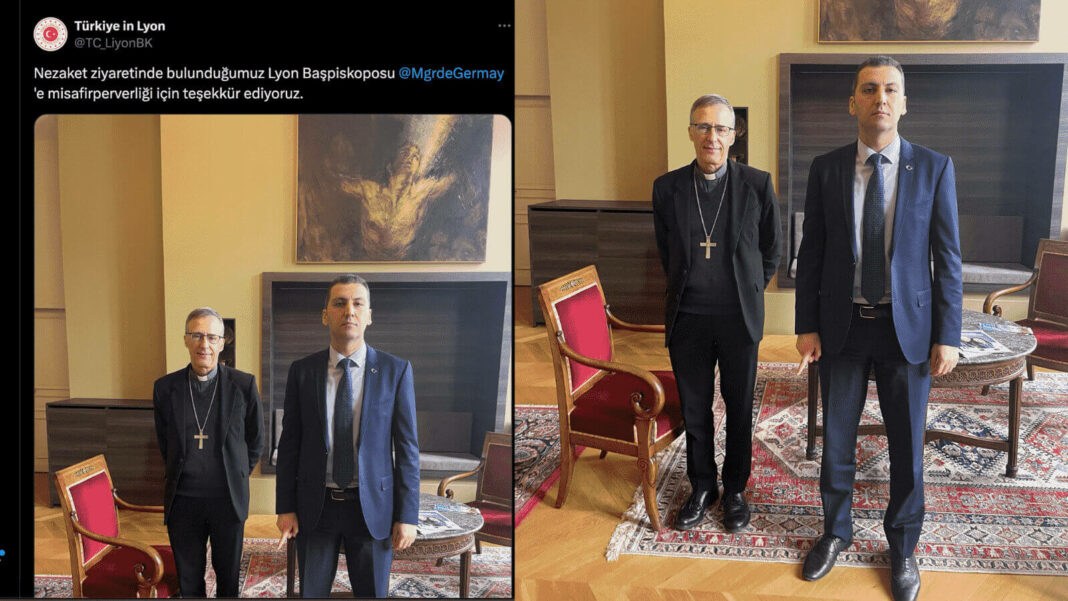Cemil Yıldırım, the Turkish consul general in the French city of Lyon, sparked criticism for making a controversial Islamic gesture during a visit to the city’s archbishop, which has again brought the credentials of Turkish diplomats under scrutiny.
Yıldırım paid a visit to Archbishop Olivier de Germay on May 7. At the end of the meeting, Yıldırım and Germay posed for a photo, which was later posted on the Lyon consulate’s X page.
In the picture Yıldırım is seen slightly in front of Germay with his suit jacket unbuttoned and the index finger of his right hand extended, while Germay, unaware of the gesture, is smiling.
A raised index finger refers to the tawhid, the belief in the oneness of God, a key component of the Islamic religion, but the gesture has over time begun to be associated with extremist groups such as the Islamic State in Iraq and the Levant (ISIL) since its militants often use it.
In Germany, for instance, the Federal Office for the Protection of the Constitution considers the gesture a symbol of Islamist radicalization, and German Interior Minister Nancy Faeser, has in the past called it unacceptable.
When Yıldırım faced a public backlash for making the controversial gesture, his photo with the archbishop was immediately deleted from the consulate’s X account.
Social media platforms in Turkey were abuzz with comments about the photo, with many accusing the Justice and Development Party (AKP) government of filling foreign ministry posts with unqualified people who lack basic diplomatic etiquette after thousands of diplomats were fired without due process under the pretext of an anti-coup fight in the aftermath of a failed coup in July 2016.
Following the coup attempt in Turkey on July 15, 2016 when the Turkish government launched a purge of state institutions under the pretext of an anti-coup fight, the foreign ministry lost a large number its personnel who were removed from their posts through government decrees.
Former foreign minister Mevlüt Çavuşoğlu revealed in October 2022, in response to a parliamentary question, that 662 ministry employees had been removed from public service since July 20, 2016, when the government declared a state of emergency.
Çavuşoğlu said the purges were carried out in line with emergency decree number 375, which concerns public servants who are determined to have links to terrorist organizations or groups or structures that are, according to the National Intelligence Organization (MİT), involved in activities that threaten national security.
The minister did not reveal how many of the purged personnel were career diplomats and how many were civilian employees.
Most of the purged public servants had alleged links to the Gülen movement, which is accused by the Turkish government of masterminding the failed coup. The movement strongly denies any involvement in the abortive putsch.
Çavuşoğlu turned the ministry over to Hakan Fidan, the former head of MİT, after a new cabinet was named in June 2023.
The Turkish government has long been the target of criticism for ending merit-based appointments in state agencies, engaging in favoritism and filling state posts with its cronies.
The foreign ministry, known as the most prestigious state institution in Turkey, used to select its personnel from successful graduates of well-known universities who received the highest scores on the central state personnel exam in addition to interviews conducted by the ministry.
Now, the ministry’s diplomats frequently come under criticism due to their poor language skills, lack of professional credentials and controversial acts in diplomatic settings.



